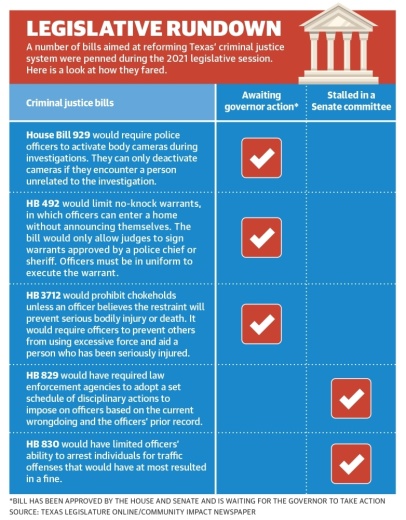While some Houston-area elected officials believe the passed bills marked significant improvements in the criminal justice system, others believe more is needed to enact substantial change.
Criminal justice reform was a prominent issue this session after Houston native George Floyd died last year, although numerous bills failed to gain approval in both the House and Senate.
Floyd died last May after former Minneapolis police officer Derek Chauvin pressed his knee against Floyd’s neck for nine minutes, sparking protests and demonstrations nationwide calling for reform. Chauvin was convicted in April of second-degree unintentional murder, third-degree murder and second-degree manslaughter, according to verdicts issued at the Fourth Judicial District Court of Minnesota.
State Sen. Joan Huffman, R-Houston, who served as chair of the Senate Committee on Jurisprudence, said the Senate worked with law enforcement and community groups to develop and pass key reform bills.
“The Senate has worked diligently on criminal justice reforms designed to instill public confidence in the justice system, ensure accountability and preserve public safety,” she said.
However, state Rep. Senfronia Thompson, D-Houston, who authored several bills pertaining to criminal justice reform that did not pass, said there was still more work to be done. She represents a portion of the Spring and Klein area.
“It was not a good session for criminal justice,” Senfronia Thompson said. “I think there was some change that we can build upon in the future.”
A closer look
Among the bills that passed are a ban on certain police chokeholds and neck restraints and a requirement for officers to intervene when they witness their colleagues using excessive force.
Additionally, Huffman lauded a pair of bills, House bills 492 and 929, which address no-knock warrant limitations and procedures for police officer body-worn cameras, respectively. She said she was proud of the Senate’s work this session.
“[While] there were other bills that did not have the votes to pass, I am hopeful that these bills will continue to strengthen the crucial relationship between law enforcement officers and the communities they serve,” she said.
However, Sandra Guerra Thompson, director of the University of Houston Criminal Justice Institute, said HB 3712, which prohibits chokeholds, has limited reach because many agencies already prohibit chokeholds.
She also cited concern over requiring officers to intervene if they see another officer use excessive force, noting exceptions exist if the officer deems the force is necessary to get the person into custody.
“There’s only a duty to intervene if the officer knows that excessive force is being used that’s illegal,” she said. “All of those things are judgment calls.”
Meanwhile, a pair of bills authored by Senfronia Thompson that failed to pass would have required law enforcement agencies to adopt a set schedule of disciplinary actions for officers and eliminated qualified immunity for officers being sued over issues including the use of force.
Sandra Guerra Thompson said she believed those bills would have had a greater effect in instituting substantial change.
“Those kinds of bills would definitely have changed the culture in terms of forcing more accountability,” she said.
Gov. Greg Abbott announced June 22 he will convene a special legislative session on July 8, according to a news release from his office. Agenda items will be released prior to the convening of the session, the release said.





